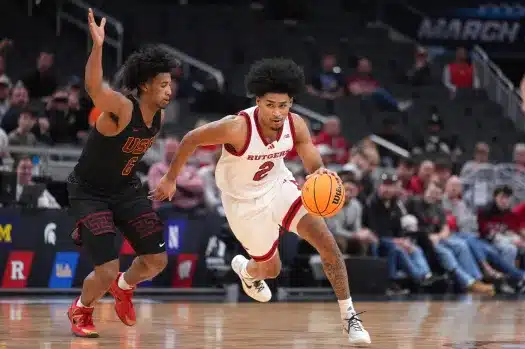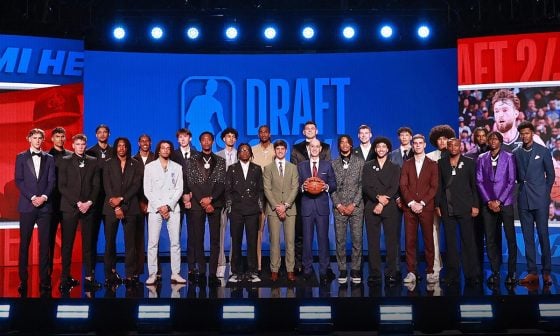Under Marcus Smart’s stewardship as the starting point guard, the Celtics were good. Well, very good. It’s hard to argue against the statistics. Over the course of the entire 2022-2023 regular season, the Celtics were the second-best offensive team (117.3 points per 100 possessions) and the second-best defensive team (110.6 points per 100 possessions), totaling the highest net rating of 6.7. Pretty good, right?
Considering Brad Stevens’ overhaul of the roster, it apparently wasn’t good enough.
As good as Boston was at 35,000 feet, a closer inspection may have forced the President of Basketball Operations to make the biggest trade of his tenure so far in dealing Smart for Kristaps Porzingis. Let’s consider the most recent memory of the postseason and in the pressure cooker of the playoffs, they were all over the place. The offense slowing degraded (118.8 offensive rating against the Hawks, 117.4 against the 76ers, and 112.2 against the Heat) and the defense fluctuated wildly (114.3 to 107.9 to 116.6).
Some of that is to be expected because of matchups, injuries, and available adjustments. Even though it took six and seven games respectively, Boston clearly had a handle on both Atlanta and Philadelphia and of course, the three-point variance in the Eastern Conference Finals strongly influenced the outcome against Miami. What might be more telling is to zoom out again and see how the Celtics performed in the clutch.
They weren’t comparatively awful (24-13 with a 4.6 net rating, good for 8th in the NBA), but they weren’t exactly dominant. It’s no surprise that the NBA Finalists were #2 and #3 in the clutch — Miami (32-22, 14.7 net) and Denver (22-15, 10.4 net); Philadelphia was first (28-17, 16.6 net). And consider this a trigger warning: in 40 clutch minutes in the playoffs, the Celtics were regrettably bad with a -11.4 net rating.
This certainly isn’t a condemnation of Smart. In the two seasons he was at the helm, he improved dramatically, and the Celtics went further than they ever have in the Stevens era. However, the front office and ownership recognized a need for a change and Stevens’ overall goal might be to create more reliable consistency on both sides of the ball.
Now, adding another three-point shooting big in Porzingis could signal even more of a commitment to spreading the floor taking even more threes. If he’s starting next to Al Horford, they could effectively play five out and bomb threes even more. With the variance of the three-point shot, that could doom them in a series again (see: Eastern Conference Finals against the Heat).
However, what Boston now has in Porzingis is a three-level scorer in the front court. Last season, he shot roughly 20% of his shots at the rim, 25% in the paint, 25% from the mid-range, and 30% behind the arc; Horford and Williams’ splits were 15-10-5-65 and 75-20-5-0 respectively. That variety will give the Celtics a threat in the high and low posts, a reliable pop and roll man in the PnR, a lob threat, and kick out release valve. Variety may be the spice of life, but it’s also the calming salve for an offense that looked discombobulated at times and degenerated into Jays isolations far too often.
On defense, it sounds crazy to suggest that losing a former Defensive Player of the Year might actually improve the collective defense. Smart could command a singular moment and often, a big hustle play could permanently change the energy of a game. Over the course of his nine seasons in Boston, you could string together all his winning plays into a pretty nice clip package. However, with how offenses target individual defenders these days, Smart’s ability to be a lockdown defender against players of all sizes could be somewhat neutralized. Don’t want Marcus mucking up a play? Force him to switch off the action.
In a recent interview with The Boston Globe’s Adam Himmelsbach, owner Wyc Grousbeck talked about the front office’s idea of reshaping the team by getting bigger. The case for adding the 7’3 Porzingis is simple: the double big lineup worked so well. When Horford and Williams played together, the Celtics gave up just 103.1 points per 100 possessions in the regular season and were a stingy 104.3 in the playoffs. Regardless of who starts, head coach Joe Mazzulla can more or less always play big with a menacing rim protector on the floor; Porzingis blocked a hundred shots last season and Boston will most likely play in drop or up to touch on screens.
Again, this isn’t to diminish Smart’s defensive prowess. The combination of his IQ and anticipation are second to none and if there was one play that Boston needed a stop, he and KG are 1a and 1b on the list to be the middle linebacker of the D. But over the entire course of a season, Porzingis’ presence might be the more consistent (but admittedly, less effective) presence over the course of an entire year.





